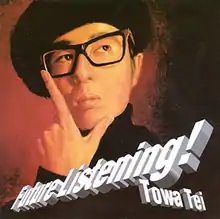Future Listening!
Future Listening! is the debut studio album by Japanese music producer Towa Tei, released on October 21, 1994 by For Life Music.[7][8] It is Tei's first release after his departure from Deee-Lite.[8] The album was released in the United States on April 25, 1995 by Elektra Records.[9]
| Future Listening! | ||||
|---|---|---|---|---|
 | ||||
| Studio album by | ||||
| Released | October 21, 1994 | |||
| Studio |
| |||
| Genre | ||||
| Length | 52:39 | |||
| Label | For Life | |||
| Producer |
| |||
| Towa Tei chronology | ||||
| ||||
| Singles from Future Listening! | ||||
| Review scores | |
|---|---|
| Source | Rating |
| AllMusic | |
| Entertainment Weekly | A−[6] |
Produced by Tei, Future Listening! includes collaborations with artists such as Joi Cardwell, Bebel Gilberto, Arto Lindsay, MC Kinky, Hiroshi Takano, Ryuichi Sakamoto, Haruomi Hosono, Toshihiko Mori, Satoshi Tomiie, Yuichi Oki of Tokyo Ska Paradise Orchestra, and Pizzicato Five vocalist Maki Nomiya.[10] The album peaked at number 50 on the Oricon Albums Chart.[11] Both "Luv Connection" (featuring Cardwell on vocals) and "Technova" (remixed by Josh Wink) were top 30 hits on the US Hot Dance Club Play chart in 1995.[12]
In 2007, Rolling Stone Japan placed Future Listening! at number 59 on its list of the "100 Greatest Japanese Rock Albums of All Time".[13] The 2007 reissue of the album peaked at number 73 on the Oricon Albums Chart.[14]
Track listing
| No. | Title | Lyrics | Music | Length |
|---|---|---|---|---|
| 1. | "I Want to Relax, Please!" | Towa Tei | 4:11 | |
| 2. | "Technova (Lá em Copacabana)" |
| Tei | 5:46 |
| 3. | "Batucada" |
|
| 3:27 |
| 4. | "Luv Connection" | Joi Cardwell | Tei | 7:52 |
| 5. | "Meditation!" | Natasha Latasha Diggs | Tei | 4:44 |
| 6. | "Raga Musgo" | Tei | 1:45 | |
| 7. | "Son of Bambi (Walk Tuff)" | Caron Geary |
| 5:53 |
| 8. | "Amai Seikatsu (Lá Douce Vie)" |
|
| 4:21 |
| 9. | "Obrigado" |
| Tei | 3:06 |
| 10. | "Dubnova (Part 1 & 2)" |
| Tei | 11:44 |
| Total length: | 52:39 | |||
| No. | Title | Length |
|---|---|---|
| 1. | "Technova" (Opaz Flying High remix ver. 3) | 7:21 |
| 2. | "Luv Connection (Towa's Dizzy Vibe)" | 4:19 |
| 3. | "Batucada" (Soul Central Foot High mix) | 7:29 |
| 4. | "Luv Connection" (Soul Central Classic mix) | 8:21 |
| 5. | "Meditation!" (instrumental version) | 4:43 |
| 6. | "Dubnova" (More Rockers remix) | 6:18 |
| 7. | "Batucada" (Phill's Batucada Club remix) | 6:17 |
| 8. | "Luv Connection" (Masters at Work dub) | 9:34 |
| 9. | "Technova" (Drumagick remix) | 5:34 |
| 10. | "Amai Seikatsu" (instrumental version) | 4:15 |
| Total length: | 64:11 | |
References
- Rosean, Samuel (December 29, 2018). "A Beginner's Guide: Shibuya Kei". Drowned in Sound. Retrieved December 11, 2020.
- "Technova | TOWA TEI" (in Japanese). Oricon. Retrieved December 11, 2020.
- Bush, John. "Luv Connection – Towa Tei". AllMusic. Retrieved December 11, 2020.
- "Towa Tei Main Works". towatei.com. Archived from the original on February 5, 2006. Retrieved December 12, 2020.
- Bush, John. "Future Listening – Towa Tei". AllMusic. Retrieved October 29, 2017.
- Ehrlich, Dimitri (April 14, 1995). "Future Listening". Entertainment Weekly. Archived from the original on June 24, 2018. Retrieved June 24, 2018.
- "Future Listening! | TOWA TEI" (in Japanese). Oricon. Retrieved December 11, 2020.
- "Factory #0140 Towa Tei – Profile" (in Japanese). Fuji TV. Retrieved October 29, 2017.
- MacDonald, Heidi (May 1995). "Towa Tei: Future Listening". CMJ New Music Monthly. No. 21. p. 41. Retrieved December 11, 2020.
- "Future Listening – Towa Tei | Credits". AllMusic. Retrieved December 22, 2011.
- "オリコンランキング情報サービス「you大樹」" [Oricon Ranking Information Service] (in Japanese). Oricon. TOWA TEI. Retrieved January 15, 2018.
- "Towa Tei Chart History (Dance Club Songs)". Billboard. Archived from the original on January 2, 2019. Retrieved January 2, 2019.
- Lindsay, Cam (November 14, 2007). "Finally! 'The 100 Greatest Japanese Rock Albums of All Time' Listed". Exclaim!. Retrieved October 29, 2017.
- "Future Listening! | TOWA TEI" (in Japanese). Oricon. Retrieved October 29, 2017.
External links
- Future Listening! at Discogs (list of releases)